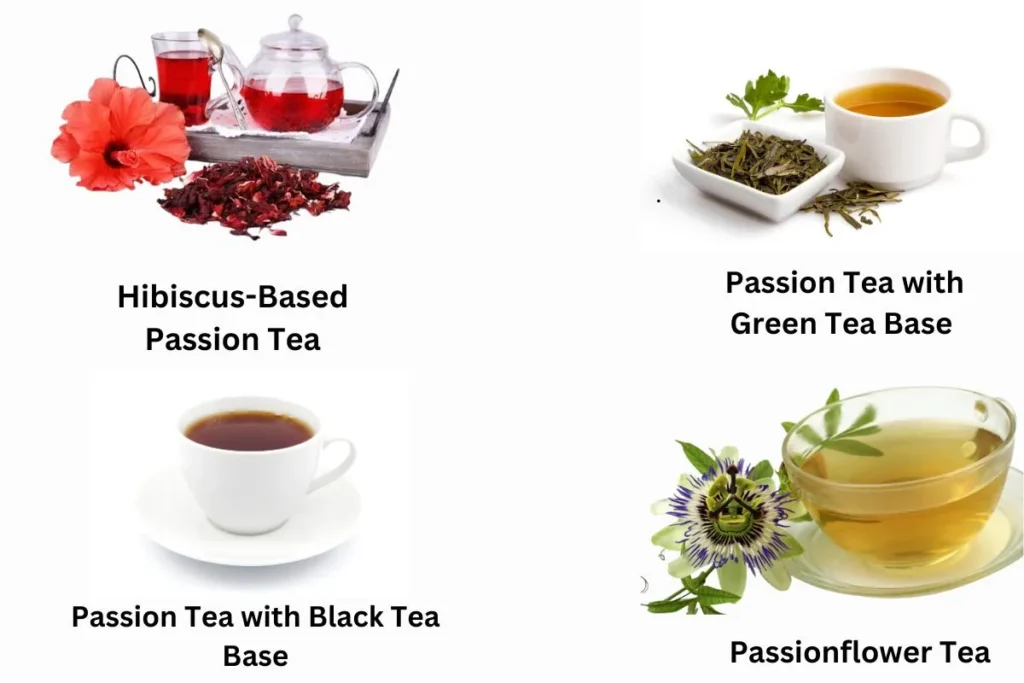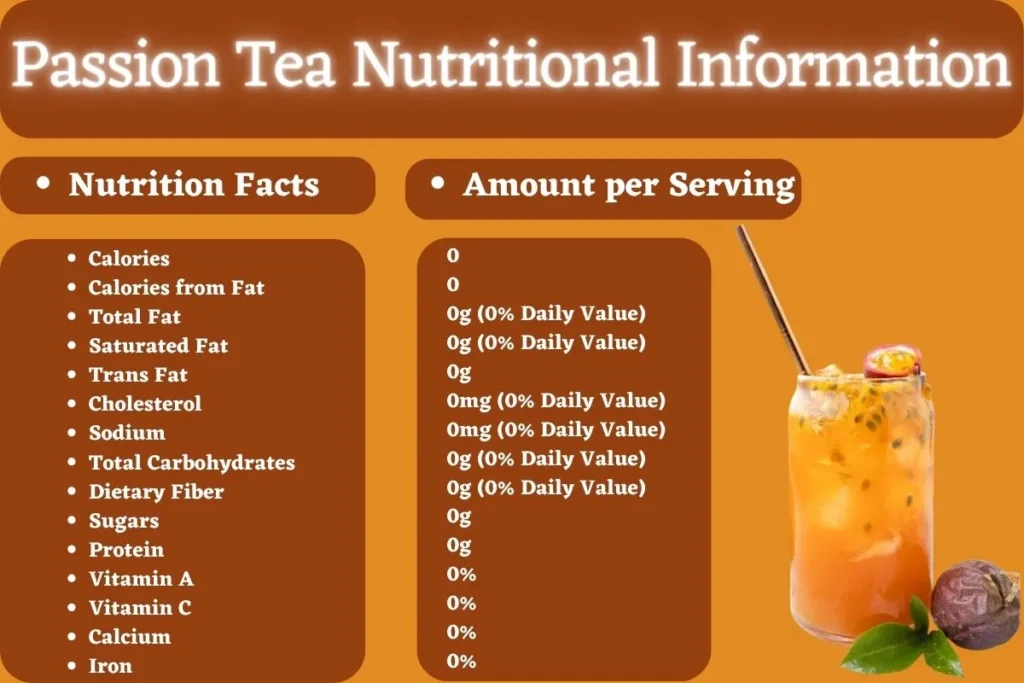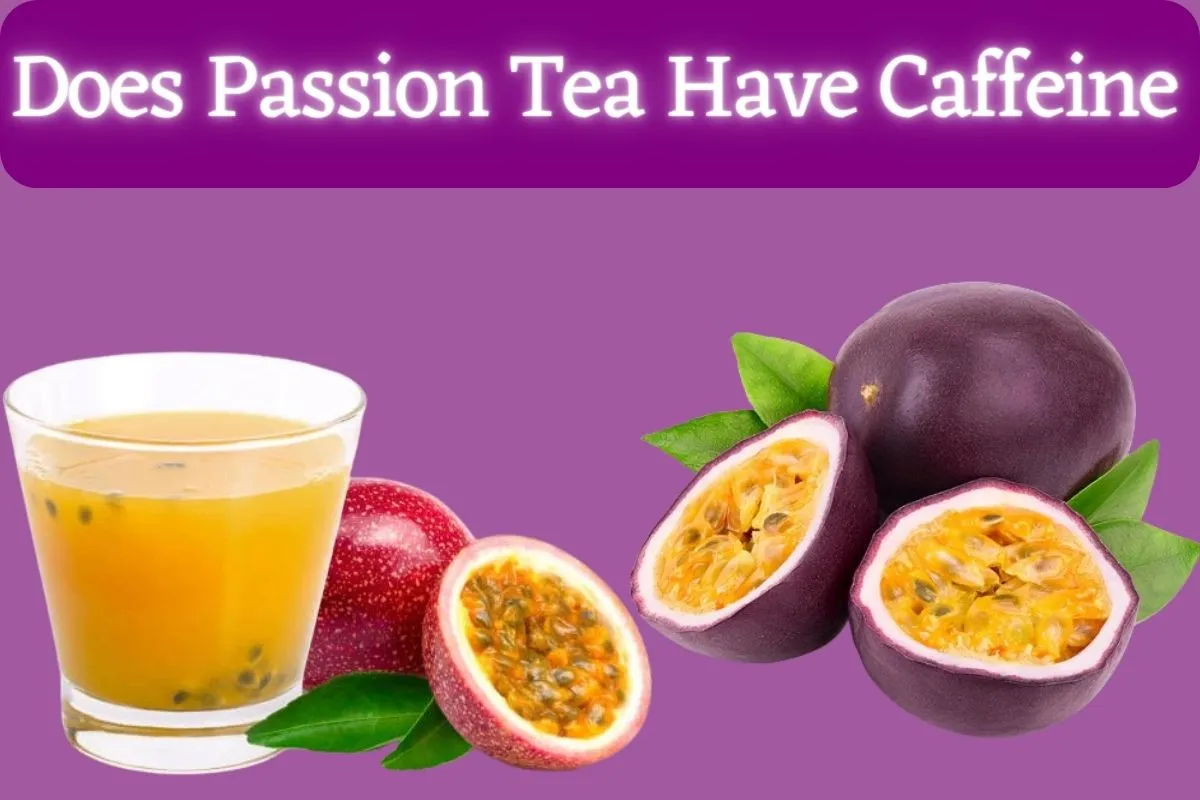While the name “passion tea” evokes images of tropical flavors, its origins lie in symbolism rather than the fruit itself. This raises a common question: Does Passion Tea Have Caffeine
This article explores the caffeine levels found in various passion tea blends, clarifying whether they provide a stimulating boost or a caffeine-free relaxation.
Importance of Knowing Caffeine Content in Passion Tea
Passion tea is enjoyed globally, offering a unique and refreshing taste, often described as sweet and fruity with hints of citrus. The benefits of passion tea include its high concentration of antioxidants, which can help protect the body against free radical damage and reduce inflammation.
It’s also a good source of vitamins and minerals, such as vitamin C, and is linked to improving cardiovascular health by supporting healthy blood pressure levels and providing anti-inflammatory properties.
There are misconceptions regarding the caffeine content in passion tea, particularly that it is always caffeine-free. While pure passion tea without added tea leaves is indeed caffeine-free, many blends available on the market contain varying levels of caffeine, making it important for consumers to check the product label if caffeine content is a concern for them.
Individuals who should be cautious about consuming passion tea, especially blends with added caffeine, include those with caffeine sensitivity, pregnant women, and individuals with certain health conditions. While caffeine has many benefits, excessive intake can lead to side effects like insomnia, nervousness, and increased heart rate. It is generally advised that pregnant women limit their caffeine intake due to potential risks associated with high consumption levels.
Does Passion Tea Have Caffeine?
Passion tea can be both caffeine-free and caffeinated, depending on its composition. Pure passion tea, made from the leaves or flowers of the Passiflora plant, is naturally caffeine-free. This type of tea is known for its unique flavor and potential health benefits, including antioxidant properties and support for cardiovascular health.
However, when passion tea is blended with leaves from the Camellia sinensis plant, such as black, green, or oolong tea, the caffeine content can vary.
The caffeine content in these blends can range significantly based on several factors:
Type of Tea Leaves:
The caffeine content differs among various types of tea leaves. For example, black tea leaves generally contain more caffeine than green tea leaves. The type of Camellia sinensis leaf used in the blend will directly influence the overall caffeine content of the tea
Processing Methods:
How the tea leaves are processed after harvesting can affect their caffeine levels. Different processing techniques can increase or decrease caffeine content, with fermented teas like black tea generally having higher caffeine levels compared to less processed teas like green tea.
Brewing Methods:
The way the tea is brewed also plays a significant role in determining its caffeine content. Longer steeping times and higher water temperatures can extract more caffeine from the tea leaves. Thus, a tea brewed for a short time at a lower temperature will typically have less caffeine than one steeped longer at a higher temperature.
Tea Leaf Age and Part:
Younger tea leaves or buds contain more caffeine than older leaves. Therefore, teas made with the top leaves and buds of the tea plant (like many high-quality green teas) will generally have a higher caffeine content than those made from lower leaves or stems.
Passion Tea Variants and their Caffeine Content

Passion tea comes in the following variants, offering different flavor profiles, caffeine content, and potential health benefits:
Hibiscus-Based Passion Tea:
This vibrant tea gets its characteristic deep red hue and tart flavor from hibiscus flowers. It’s often blended with tropical fruit flavors (especially passion fruit), lemongrass for brightness, and occasionally rosehips for a touch of sweetness. Generally caffeine-free, hibiscus-based passion tea is a fantastic choice for those looking for a refreshing beverage that can be enjoyed throughout the day and into the evening.
Passion Tea with Black Tea Base:
This type of passion tea starts with a base of black tea, known for its robust flavor and moderate caffeine content. The black tea is then infused with passion fruit flavoring and sometimes complemented by other ingredients like apple, citrus, or spices. It contains a moderate amount of caffeine due to the black tea base. Expect approximately 40-60 mg of caffeine per cup, similar to a lightly brewed cup of coffee.
Passion Tea with Green Tea Base:
This version offers a slightly different flavor profile compared to the black tea variation. Green tea provides a grassier, more vegetal base that pairs well with the tartness of passion fruit. It offers a slightly lower amount of caffeine compared to black tea-based blends. Expect around 30-40mg of caffeine per cup.
Passionflower Tea:
This tea is brewed from the leaves and flowers of the Passiflora plant. It’s known for its potential calming and relaxation-promoting properties, making it a popular choice before bedtime. Naturally caffeine-free, Passionflower Tea offers a soothing experience without any stimulating effects.
List of Ingredients in Passion Tea
Passion tea ingredients can vary significantly depending on the brand and blend, ranging from purely herbal to combinations with traditional tea leaves. Below is a generalized list of ingredients commonly found in various passion tea products:
- Hibiscus Flowers: Often a base ingredient in many passion tea blends, hibiscus contributes a tangy flavor and vibrant red color.
- Rose Hips: Adds a slightly sweet, tangy flavor and is a good source of vitamin C and antioxidants.
- Orange Peel: Provides a citrusy zest, adding depth to the tea’s flavor profile.
- Lemongrass: Offers a refreshing, lemony taste and aroma, complementing the tropical theme of passion tea.
- Licorice Root: Known for its naturally sweet flavor, licorice root can add sweetness without the need for added sugars.
- Cinnamon: Adds warmth and a slightly spicy note to the tea.
- Natural Tropical Flavors: These may include natural extracts or oils from passion fruit, mango, or other tropical fruits to enhance the tea’s fruity taste.
- Citric Acid: Used to adjust the acidity, citric acid can help balance the sweetness and tartness of the tea.
- Apple Pieces: Some blends include dried apple pieces for their sweet, fruity flavor.
- Passion Flower: Specifically in herbal blends focused on the calming effects of the passion flower, this ingredient may be included for its potential health benefits.
- Stevia Leaf Extract: For blends aiming to be calorie-free while still offering sweetness, stevia, a natural sweetener, might be used.
- Marigold Flowers: Used for their colorful appearance and subtle flavor, contributing to the aesthetic appeal of the tea.
- Raspberry Leaves: Occasionally included for their herbal notes and potential health benefits.
Passion Tea Nutritional Information

Tazo Passion Tea is a fantastic option for those looking to enjoy a flavorful beverage without the worry of added calories or fat. It boasts a clean nutritional profile with zero calories, zero grams of total fat (including both saturated and trans fats), and no cholesterol or sodium.
This makes it a particularly appealing choice for individuals following a calorie-controlled or heart-healthy diet. Furthermore, it contains no carbohydrates, dietary fiber, sugar, or protein, allowing you to indulge without impacting your macronutrient intake. However, it’s important to note that Tazo Passion Tea doesn’t offer a significant source of vitamins or minerals such as Vitamin A, Vitamin C, calcium, or iron.
| Nutrient | Amount per Serving |
| Calories | 0 |
| Calories from Fat | 0 |
| Total Fat | 0g (0% Daily Value) |
| Saturated Fat | 0g (0% Daily Value) |
| Trans Fat | 0g |
| Cholesterol | 0mg (0% Daily Value) |
| Sodium | 0mg (0% Daily Value) |
| Total Carbohydrates | 0g (0% Daily Value) |
| Dietary Fiber | 0g (0% Daily Value) |
| Sugars | 0g |
| Protein | 0g |
| Vitamin A | 0% |
| Vitamin C | 0% |
| Calcium | 0% |
| Iron | 0% |
Alternatives to Passion Tea and their Caffeine Content
Here are some alternatives to passion tea:
Chamomile Tea:
A soothing substitute for passion tea, chamomile tea has a mild floral aroma and is free of caffeine, contributing to its calming benefits.
Rooibos Tea:
Hailing from South Africa, rooibos tea is naturally caffeine-free and boasts a sweet and nutty flavor profile, perfect for those seeking a warm and comforting beverage.
Peppermint Tea:
Refreshing and invigorating, peppermint tea provides a cooling sensation and a crisp, minty flavor, making it an excellent alternative to passion tea, especially during hot weather.
Fruit Infusions:
Infusing water with fresh fruits like berries, citrus slices, or tropical fruits offers a naturally sweet and flavorful alternative to traditional tea, ideal for those looking to stay hydrated without caffeine.
Herbal Blends:
Try some different herbal combinations, such ginger, lemon balm, or lavender; they have distinct flavors and may be good for you without having the same energizing effects as coffee.
Decaffeinated Black or Green Tea:
For individuals who enjoy the taste of tea but prefer to avoid caffeine, decaffeinated versions of black or green tea are available, offering the familiar taste of tea without the energizing effects.
Golden Milk:
Made with turmeric, ginger, and warm milk, golden milk is a soothing and nourishing beverage known for its anti-inflammatory properties and earthy, aromatic flavors.
Hot Cinnamon Spice Tea:
With its blend of cinnamon, cloves, and orange peel, hot cinnamon spice tea provides a warm and comforting alternative to passion tea, perfect for cozy evenings or chilly days.
| Beverage | Caffeine Content |
| Chamomile Tea | Caffeine-free |
| Rooibos Tea | Caffeine-free |
| Peppermint Tea | Caffeine-free |
| Fruit Infusions | Caffeine-free |
| Herbal Blends | Caffeine-free |
| Decaffeinated Black Tea | Up to 2 mg caffeine |
| Decaffeinated Green Tea | Up to 2 mg caffeine |
| Golden Milk | Caffeine-free |
| Hot Cinnamon Spice Tea | Caffeine-free |
Conclusion
Does Passion Tea Have Caffeine? The caffeine content in passion tea varies: pure blends from the Passiflora plant are caffeine-free, while those mixed with Camellia sinensis leaves contain caffeine. The amount of caffeine can depend on the specific blend and how it’s brewed.
For those looking to avoid caffeine, there are several caffeine-free alternatives to enjoy. Checking product labels or asking about the blend can help ensure your tea choice matches your caffeine preference.
Frequently Asked Questions
Q1. What is passion tea good for?
Passion tea offers a variety of potential benefits depending on the type. Hibiscus-based blends provide a refreshing, caffeine-free source of hydration. They may also offer some antioxidant properties due to the hibiscus and other ingredients. Passionflower tea is known for its traditional use as a natural sleep aid and for its potential calming effects.
Q2. Why is it called passion tea?
The name “passion tea” can be a bit misleading. Hibiscus-based blends likely got their name from the vibrant color and tropical flavors, not from actual passion fruit. Passionflower tea gets its name because early Christian missionaries saw symbolism in the flower relating to the Passion of Christ.
Q3. What are the side effects of passion tea?
Most types of passion tea are generally considered safe when consumed in moderation. However, excessive consumption of hibiscus-based tea can occasionally lead to stomach upset in some individuals. Passionflower tea can cause drowsiness, dizziness, or confusion, especially when combined with other medications. It’s best to consult your doctor before using passionflower tea if you are taking any medications or have underlying health conditions.
Q4. Can I drink passionflower tea everyday?
While passionflower tea is generally considered safe, it’s recommended to talk to your doctor before incorporating it into your daily routine. They can advise you on appropriate dosages and potential interactions with any medications you take. It’s often wise to cycle herbal remedies rather than using them consistently for extended periods.
Q5. Is passion tea good for sleep?
Passionflower tea has long been used as a traditional sleep aid. Some studies suggest that it may increase levels of GABA in the brain, promoting relaxation and improving sleep quality. However, more research is still needed to confirm its effectiveness definitively.

Rossi Glover, the passionate Owner of Grand Lake Coffee, infuses every cup with her love for coffee and dedication to quality. With an extensive background in the art and science of coffee, Rossi is not just a connoisseur but a storyteller, sharing the intricate tales behind each brew.

